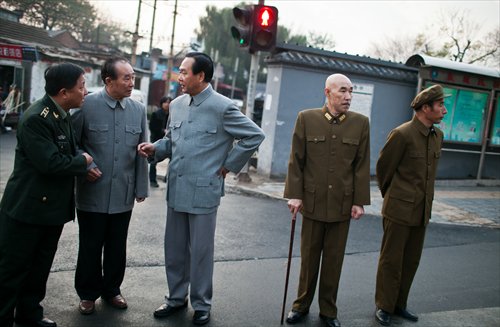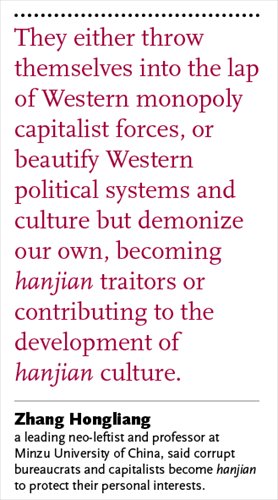China's radical leftists call for vocal critics of the Party to be jailed for treason
Radical leftists call for vocal critics of the Party to be jailed for treason
China's hard-line leftists are Increasingly calling for the government to launch a campaign against hanjian, or traitors to China, a term which many worry is simply used to bash anyone who disagrees with their views.

Actors impersonate former Chinese leaders. Photo: Li Hao/GT
The suspension of property tycoon Ren Zhiqiang's Communist Party of China (CPC) membership over his Weibo posts has been widely lauded by China's neo-leftists. Ren had often posted comments critical of Party policies.
Many leftists saw this as another victory for their point of view, hot on the heels of the suspension of CCTV host Bi Fujian last year after he was filmed denigrating Chairman Mao at a private dinner. Both Bi and Ren were given Party punishment.
In general, China's neo-leftists advocate a large role for the State in the economy, a renewed spirit of collectivism and resurgent nationalism.
"It seemed that we had been marginalized and suppressed. But the punishment of Ren, as well as the recent adoption of the law regulating overseas NGOs, both show that the central leadership is listening to our appeals," Zhang Hongliang, a leading neo-leftist and professor at Minzu University of China, told the Global Times on May 4. "They lit new hopes and raised our spirits."
Beijing's Xicheng district CPC committee announced on May 2 that Ren's Party membership is under one year of probation. An outspoken Weibo celebrity that had more than 37 million followers, Ren's social media accounts were shut down in February following several critical remarks.
But some hard-line leftists, including Zhang, believe Ren's punishment was not harsh enough. They are convinced that China urgently needs to create a law and launch a campaign to punish and eliminate hanjian, or traitors to China.
They claim that so-called "hanjian culture" is now widespread as rightists and liberals have risen to prominent positions in China and now constitute a growing threat to CPC rule.
Recently, a red-themed concert held in the Great Hall of the People was widely criticized for "singing" to commemorate the 50th anniversary of the Cultural Revolution (1966-76). The concert was accused of using too many of the symbols of that period, such as the song "Sailing the Seas Depends on the Helmsman" which compares Mao Zedong Thought to the sun and the revolutionary slogan "the people of the world unite to bring down the US imperialist aggressors and all their running dogs."
In a QQ messaging group for leftists, many of the group's hundreds of members expressed anger over this outcry, labeling it a "crazy attack" by hanjian forces.
Nevertheless, many scholars and even some others leftists believe that their claims of a widespread culture of traitors are exaggerated and the mindset of radical leftists like Zhang is a legacy of the Cultural Revolution which needs to be eradicated.

Historical hotbed
After Ren's punishment was announced, a giant advertisement was posted outside Changsha Train Station in Central China's Hunan Province, the tagline of which read "You may stop speaking, but you cannot stop breathing" next to a portrait of Ren wearing an anti-air pollution mask.
Zhang saw it as disrespectfully mocking Ren's punishment. "It's irritating. It's sad many capitalist entrepreneurs stand against the CPC and betray the nation," Zhang claimed. "They do all that out of fear."
Zhang and his followers believe China's reform and opening-up allowed hanjian to proliferate. They argue that since the process began in 1979, many State-owned assets and public property has been "illegally" privatized. And now corrupt bureaucrats and capitalists are frightened that their ill-gotten wealth and political rights will be reclaimed by the public one day.
"So they either throw themselves into the lap of Western monopoly capitalist forces, or beautify Western political systems and culture but demonize our own, becoming hanjian traitors or contributing to the development of hanjian culture," Zhang said.
In their eyes, "hanjian" are nearly everywhere, including those who leak State secrets, ethnic separatists, defenders of historical Japanese aggression, those who oppose the CPC, critics of late Party leaders, deniers of revolutionary martyrs, advocates of GM food and those who support the privatization of State-owned industries.
Xiao Gongqin, a history professor with Shanghai Normal University, believes that neo-leftists like Zhang are actually extreme nationalists. "They are radical and always overestimate the reach of Western conspiracies. In their eyes, everybody who engages with Western countries or agrees with Western values is evil and hostile," Xiao told the Global Times. He was labeled a hanjian for saying that mainstream Japanese values are more pacifistic than militaristic.
"Their mindset is still stuck in the Cultural Revolution," Xiao noted.
Another leftist critic Guo Yiping claims that those who don't want to uphold the road of socialism are all traitors to China.
"There are two main kinds of hanjian, one is those who are infatuated with the market and privatization, the other is those who got rich through power exercised without public supervision," Guo told the Global Times.
But Guo doesn't think the reform and opening-up should be blamed. When the thoughts of the masses are far away from communism, it's understandable that they would want to develop productivity through adopting the market and competition, said Guo, who works at a Beijing book firm that produces education materials for teenagers.
"But it's problematic to deny public ownership and derail the socialist development road. Collectivism has been one of our great advantages and has helped us accomplish many major projects," he noted.
Law urgent?
Hanjian, which literally translates as a traitor to China's majority ethnic group the Han, has been used to refer to Chinese who collaborated with foreign powers or aggressors and betrayed the interests of the Chinese nation, according to the Contemporary Chinese Dictionary.
The word was widely used during the War of Resistance against Japanese Aggression (1931-45). A People's Liberation Army Daily report in July last year said there were at least 3 million Chinese soldiers fighting for the Japanese in that period, people the newspaper labeled hanjian.
The report claimed the soil today for hanjian is still fertile and a new generation of hanjian are thriving in fields of economy, politics and Internet. It also listed several "traitorous" statements, including quotes from Mao Yushi, an outspoken economist and free market advocate.
Mao and He Weifang, professor at Peking University Law School, were criticized in a documentary film allegedly made by the Chinese PLA National Defense University in 2013 which warned against US ideological infiltration and political subversion.
Zhang and Guo are two of many leftists who are behind the call for a law to punish hanjian. "Nowadays, hanjian remarks are rampant. Many teachers in colleges also make traitorous remarks. They defend the US, Japan and previous invaders," Zhang said.
In recent years, netizens and some scholars have started to question the truth of stories of revolutionary martyrs like the "Five Heroes of Langya Mountain" - who according to the official narrative sacrificed their lives to fight Japanese aggression.
"If martyrs are slandered, who will defend the country with their lives in the future?" he asked.
Zhang Haipeng, a modern history researcher with the Chinese Academy of Social Sciences (CASS) says that this law is not a good idea. "If they just make traitorous claims, criticism is enough," Zhang Haipeng told the Global Times.
He said in a global environment of peace and an era in which China has broad exchanges with the world, such a law sounds unrealistic and impossible.
But Guo believes that a law targeting hanjian, which specifies what activities count as traitorous is feasible. Zhang thinks that legal force is a greater deterrent than policy or regulations.
Guo claims that a US "fifth column" has infiltrated China's officialdom and aims to overthrow the CPC and undermine socialism, citing the introduction of American GM seeds, State purchases of US junk bonds and the privatization of railway construction.
According to some accusations made by radical leftists, GM food is an American plot to experiment on China, control grain production or even to exterminate the Chinese race.
He also said the crimes of former Politburo member and security chief Zhou Yongkang and Ling Jihua, former head of the United Front Work Department of the CPC Central Committee, were both linked to illegally acquiring and leaking State secrets.
Zhang Hongliang said hanjian were to blame for every time China has even been defeated by another country, and has called for a nationwide campaign to eradicate them.
Legacy of Cultural Revolution
A proposal to create an anti-hanjian law was first submitted by Yu Quanyu, a political adviser and Marxist theorist from CASS during the annual two legislative sessions in 2007. Yu suggested that those who "defend the aggression of Western powers since the 1840 opium war" be given a 10-year jail sentence, and that up to 20 years behind bars be given to those who defend Japanese aggression.
But the proposal met with public outcry. Yu died in 2010 and no similar proposals have been submitted to the two sessions ever since.
Zhang Lianqiang, 49, a loyal follower of Chairman Mao and accountant at a private company in Yantai, Shandong Province, said it hurts him to see attacks on Mao online. "But I don't agree with using the word hanjian arbitrarily. I believe both rightists and leftists are patriotic and they want the country to improve and to be prosperous," he told the Global Times.
Some say the arbitrary usage of hanjian reflects China's ideological chaos. Extreme thoughts abound in China whenever the country is at a crossroads.
Xiao said the young leftists wish their fantasy of the Cultural Revolution could return when they face problems or setbacks in reality; witness social unfairness and dishonest business practices; and experience income disparity.
"They usually attribute all the problems that have emerged during reform and opening-up to their perception that China has already left socialism for capitalism," he explained.
Xiao said the anti-hanjian movement is very harmful. "By classifying people they disagree with as hanjian, they seize the moral high ground and leave no room for peaceful negotiations to seek common ground," he noted.
The consequence may be that internal conflicts will easily turn into class contradictions, which wreaked havoc in China five decades ago, he argued.
Newspaper headline: Eradicate traitors